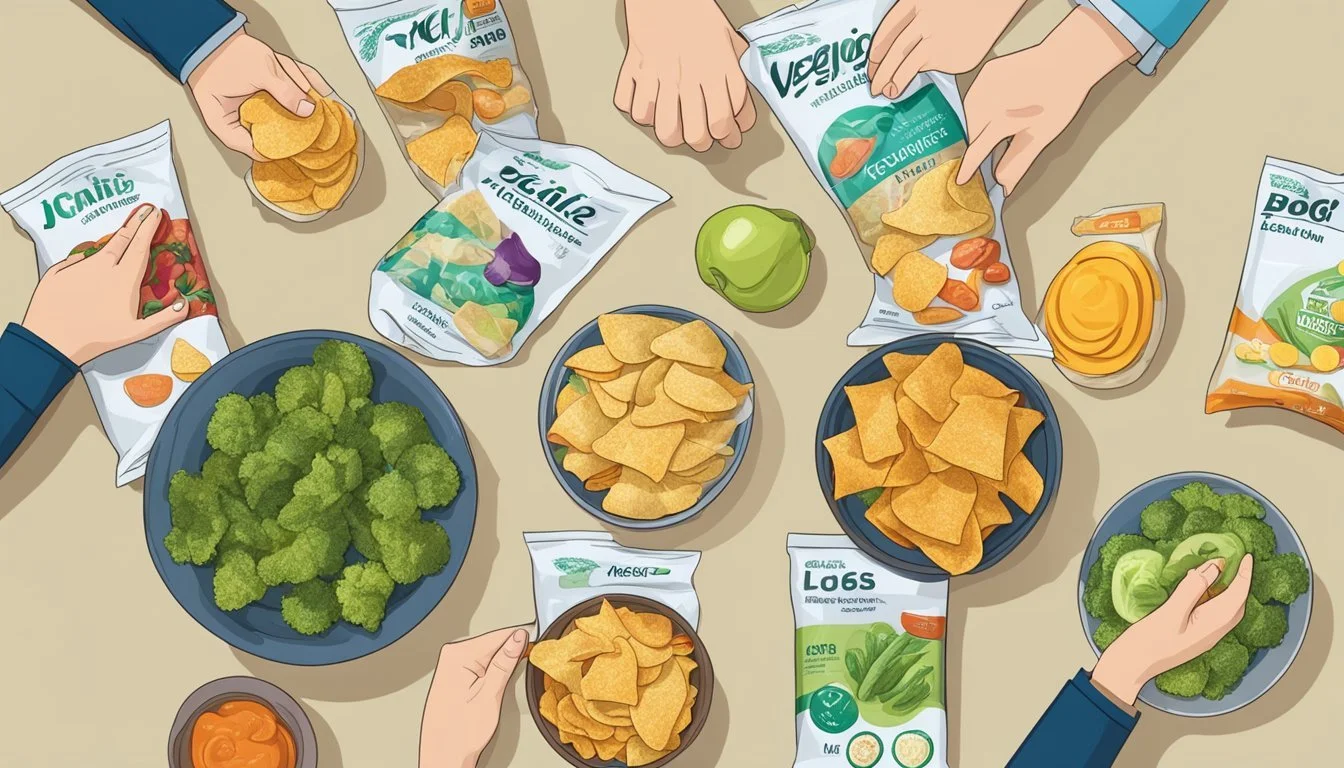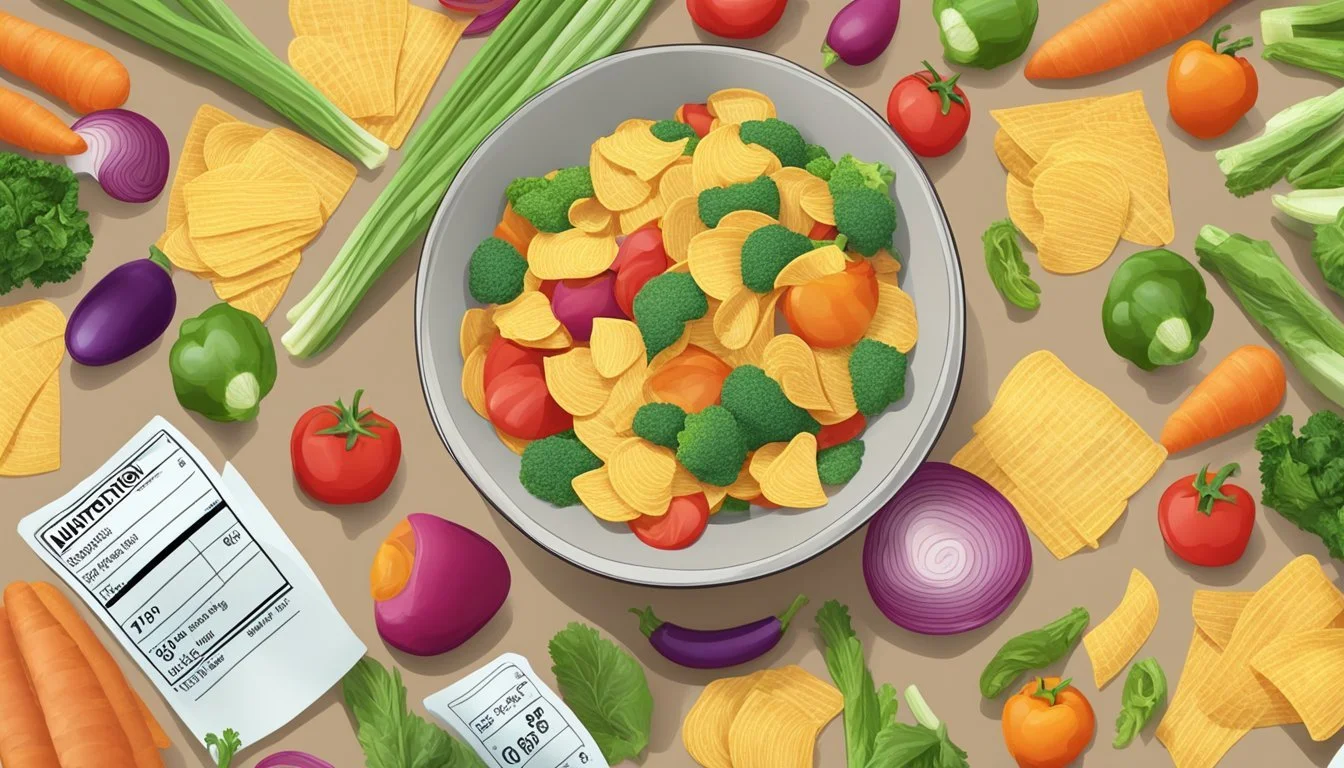Are Veggie Chips a Healthy Snack Alternative?
Unpacking the Nutritional Value
The snacking aisle at the grocery store is often bustling with a variety of options, each claiming to be a healthy choice. Among these, veggie chips are a popular alternative that comes with the promise of delivering the nutritional benefits of vegetables in a convenient, crispy form. They are often marketed as a better choice over traditional potato chips, appealing to those looking to eat healthier without giving up on their love for snacking.
However, the question of whether veggie chips truly represent a healthier option is worth considering. While some veggie chips do contain ingredients such as sweet potatoes (What wine goes well with sweet potatoes?), which are a good source of vitamin A, potassium, and B vitamins, it is essential to scrutinize the nutritional content of these snacks (What wine goes well with snacks?). The process of creating veggie chips often involves frying and seasoning, which can add to the calorie and sodium count, diminishing their nutritional advantage.
Examining the labels for calorie, fat, sodium content, and the presence of added sugars or artificial ingredients gives a clearer picture of how healthy veggie chips are. Just because a snack is derived from vegetables doesn't necessarily mean it's beneficial; the overall processing and additives play a crucial role in determining its health value. Consequently, individuals should approach veggie chips with the same critical eye they would any other processed food when trying to maintain a balanced diet.
Understanding Veggie Chips
Veggie chips are often marketed as a healthier snack alternative, but to assess their true value, one must look at their ingredients, nutritional profile, and how they stack up against traditional snacks like potato chips.
Definition and Comparison to Traditional Snacks
Veggie chips are snacks made from various dehydrated or fried vegetables. They can include sweet potatoes, parsnips, beets, yucca, or carrots. Compared to traditional potato chips, which typically contain just potatoes, vegetable oil, and salt, veggie chips may offer a wider range of vitamins and minerals, depending on the vegetables used. However, both snacks generally undergo a cooking process involving high temperatures and oil, which can decrease the nutritional value of the original vegetables.
Potato Chips (per 1oz serving):
Calories: 160
Fat: 10g
Sodium: 170mg
Carbohydrates: 15g
Fiber: 1g
Protein: 2g
Veggie Chips (per 1oz serving):
Calories: Can vary, commonly around 150
Fat: Can vary, commonly around 9g-11g
Sodium: Can vary, commonly around 150mg-170mg
Carbohydrates: Can vary
Fiber: Can vary
Protein: Typically 1g-2g
Nutritional Profile
The nutritional content of veggie chips can differ across brands and vegetables. For a serving size similar to potato chips, veggie chips can have comparable calorie and fat content. One advantage might be the presence of nutrients like vitamin A or potassium linked to the vegetables used. However, some veggie chips may still be high in sodium. The dietary fiber content is often marginally better in veggie chips, which is beneficial for digestive health.
Health Claims vs. Reality
When considering veggie chips as a healthy snack, it is crucial to understand the gap between health claims and reality. While they can provide nutrients absent in potato chips, the benefits may be offset by the presence of similar levels of calories, fat, and salt. Consumers should be wary of front-of-package marketing and review the ingredient list and nutritional facts to ensure that the vegetables are indeed the primary ingredient and not just fillers or flavoring. They must also consider how processing affects the nutrition quality of the original vegetables.
Key Ingredients in Veggie Chips
In examining veggie chips, it is essential to identify the primary components and additives that define their quality and nutritional profile. Equally important is understanding how these ingredients measure up against traditional potato chips.
Common Ingredients and Additives
Veggie chips commonly contain a mix of vegetable powders and flours, such as potato starch and potato flour, to create their base. They also often include oil for frying or baking, which contributes to their fat content. Seasonings and sodium are added for flavor, and some may contain sweet potato as a significant ingredient.
Ingredients: Vegetables (such as kale, beetroot, sweet potato), potato starch, potato flour
Additives: Oil (sunflower, safflower, canola), seasonings, salt
Potential Benefits of Vegetable-Based Ingredients
Veggie chips made with actual vegetables can offer certain nutritional advantages, thanks to the inclusion of vitamin-rich vegetables such as kale and sweet potatoes, which are high in vitamin A, potassium, and B vitamins.
Sweet potatoes: Provide a good source of dietary fiber and key nutrients.
Kale chips: May offer more vitamins and minerals compared to other vegetable chips.
Comparison: Veggie vs. Potato Chips
When comparing the key ingredients of veggie chips to potato chips, it becomes apparent that the nutritional content can be similar. However, the presence of vegetables in veggie chips may offer added nutritional benefits, although this is highly dependent on the proportion of vegetables to other ingredients such as oils and flours.
Potato Chips: Primarily made with potatoes, vegetable oil, salt.
Veggie Chips: Blend of vegetables, oils, and often a mix of potato starch and flour for texture.
Ingredient Veggie Chips Potato Chips Base Vegetable powders Potatoes Secondary base Potato starch/flour None Oil Various types Often vegetable oil Sodium Moderate to high levels Moderate levels
In summary, veggie chips incorporate a variety of ingredients and additives that affect their healthfulness. Understanding their composition helps consumers make informed choices about snacking options.
Health Considerations
When considering veggie chips as a snack, one should take into account their caloric content, sodium, fat, and nutrient profile to understand how they might fit into a health-conscious diet.
Caloric Content and Weight Management
Veggie chips, such as Jackson's Sweet Potato Chips, contain approximately 150 calories per serving. Calories are a crucial concern for those managing their weight, as consuming more calories than expended can lead to obesity. Veggie chips offer a similar calorie count to regular potato chips, indicating that they should be consumed in moderation as part of a balanced diet.
Sodium and Blood Pressure Issues
A standard serving size of veggie chips can contain between 150 to 300 milligrams of sodium. High sodium intake is associated with increased blood pressure and the potential for heart disease. It is recommended that individuals with blood pressure concerns closely monitor their sodium intake, even with seemingly healthier options like veggie chips.
Fat Content and Types of Oil
Fat content in veggie chips can vary, with some brands like Tyrrells having around 11 grams of fat per serving. The type of oil used for frying also plays a role in the healthfulness of the chips. Saturated and trans fats, in particular, are to be avoided for heart health. Consumers should look for chips that use oils lower in these unhealthy fats.
Presence of Nutrients and Fiber
Veggie chips can provide nutrients such as vitamin A, potassium, and B vitamins. Sweet potato chips, for instance, are a good source of vitamin A. However, the process of making chips can strip away fibers and other nutrients, leaving them less nutrient-dense than their whole vegetable counterparts. To reap the benefits, one should seek out options that are high in fiber and retain more of their original nutritional value.
Analyzing Different Brands
In selecting healthier snack alternatives, it is critical to assess veggie chip brands on their variety, nutritional content, and transparency. Each brand offers a unique take on what constitutes a "healthy" veggie chip, demanding a thorough critique.
Product Variety and Comparison
Many veggie chip brands boast a range of products, from traditional sweet potato chips to more innovative options like lentil chips. Sensible Portions and Rhythm Superfoods are two noteworthy brands. Sensible Portions provides a selection of garden veggie straws and chips with a focus on minimal ingredients. Conversely, Rhythm Superfoods emphasizes the nutritional benefits of kale, offering kale chips in various flavors.
Sensible Portions: Offers variety such as Zesty Ranch and Sea Salt flavors.
Rhythm Superfoods: Focuses on kale-based chips, branching into unique seasoning blends.
Label Literacy: Interpreting Nutrition Facts
Consumers should read labels critically, evaluating nutrition facts for calorie count, fat content, sodium levels, and the presence of actual vegetables. Here's a comparative look at the nutritional labels of two popular brands:
Jackson's Sweet Potato Chips:
Calories: 150
Fat: 9g (Saturated: 1g)
Sodium: 150mg
Carbohydrates: 16g (Fiber: 2g, Sugar: 3g)
Protein: 1g
Tyrrells Veg Chips:
Calories: 150
Fat: 11g (Saturated: Unknown)
Sodium: 170mg
Carbohydrates: Unknown (Fiber: Unknown, Sugar: Unknown)
Protein: Unknown
Jackson's Sweet Potato Chips offer a balance of nutrients with a good source of fiber and controlled sodium levels. On the other hand, the Tyrrells Veg Chips provides a calorie count similar to traditional potato chips, and while their fat content is higher, the specifics on fiber and sugar are not clearly stated.
Popular Veggie Chip Brands
When assessing popular veggie chip brands, consumers typically see a wide spectrum, from those that closely mimic the taste and texture of traditional potato chips to those that offer a greater nutritional punch.
Jackson's: Seen as a leader for providing a satisfying crunch with added nutritional benefits like vitamin A, potassium, and B vitamins.
Tyrrells: Closely resembles the taste profile of standard chips but requires a closer inspection of the label for full nutritional transparency.
Brands should be scrutinized beyond the front of the package, which may make broad health claims. Instead, flipping the package and reading the actual ingredients and nutrition facts panel provides a clearer picture of the snack's health profile.
Consumption Tips
When considering veggie chips as a snack, it's essential to focus on serving sizes and integrating them sensibly within a complete dietary plan. Opting for appropriate dip choices can also enhance nutritional value while keeping snack time enjoyable.
Serving Size and Portion Control
Consumers should be mindful of the recommended serving size, which typically ranges from about 15 to 30 chips, depending on the brand. Adhering to the advised portion helps prevent overconsumption, which can lead to excess calorie intake.
Advised Portion: 15-30 chips
Calories: May vary (usually around 150-160 per serving)
Incorporating Veggie Chips into a Balanced Diet
Veggie chips should complement, not replace, whole vegetables in one's diet. They can be a part of a balanced meal when paired with substantial foods like a salad or included as a side to sandwiches. To enhance their healthfulness, individuals should look for chips made with real vegetables as the primary ingredient.
Balanced Meal Example:
Main: Salad with mixed greens, tomatoes, and lean protein
Side: Serving of veggie chips
Healthy Dipping Options
Pairing chips with dips like hummus or yogurt-based spreads can offer additional nutrients and make for a satisfying snack. For those craving sweetness, consider a small amount of nut butter with apple slices instead of chips.
Dip Suggestions:
Savory: Hummus, greek yogurt dips, salsa
Sweet: Nut butters for pairing with fruit
Consumers are encouraged to remember these guidelines to ensure that their intake of veggie chips remains within a healthy, balanced dietary framework.
Homemade Alternatives
Homemade veggie chips offer a healthier snack option by allowing control over ingredients and cooking methods. These chips can be tailored to individual taste preferences while providing a range of nutrients.
DIY Veggie Chips Recipes
Creating veggie chips at home is straightforward. For basics, one needs a mandoline slicer or a sharp knife to achieve thin, even slices of vegetables. These slices can be either baked or air-fried. Sweet potatoes, beets, and other root vegetables like parsnip, taro, and yuca are ideal for their firm texture and naturally sweet or earthy flavors. To prepare, one should:
Preheat the oven to 375°F (190°C) or air-fryer to the appropriate temperature.
Slice the chosen vegetables thinly and uniformly.
Toss lightly with olive oil and a pinch of salt.
Arrange in a single layer on a baking sheet or air-fryer basket.
Bake or air-fry until crispy, turning halfway through.
Nutritional Advantages of Homemade Chips
Homemade chips are beneficial due to their reduced sodium and absence of preservatives found in store-bought varieties. Root vegetables are rich in fiber, vitamins, and minerals. By making chips at home, one can choose healthier oils and seasoning, controlling the overall calorie and nutrient content.
Creative Vegetable Choices for Homemade Chips
Experimenting with vegetables can keep snacking interesting and nutritious. Beyond the common sweet potato and beet chips, one could try:
Cauliflower slices, oven-baked to a crisp finish.
Parsnip or taro chips, thinly-sliced and spicy.
Thinly-sliced yuca, baked until golden brown for a unique taste.
Each vegetable brings its own set of nutrients, flavors, and textures, making homemade veggie chips a dynamic and healthy snacking choice.
Expert Insights
In determining the health value of veggie chips as snack alternatives, insights from dietitians and nutritionists, along with recent research findings, offer a grounded perspective on their nutritional impact.
Dietitian and Nutritionist Perspectives
Dietitians and nutritionists often advise inspecting the ingredient list of any packaged snack to ascertain its true nutritional content. A product labeled as a veggie chip should primarily contain vegetables. However, not all veggie chips are created equal. They may be high in dietary fiber and contain essential nutrients, but many are also high in sodium and fats.
Nutritionists caution against heavily processed veggie chips which are often low in nutritional value and might be as calorie-dense as regular potato chips.
They also note that some veggie chips can be a good source of vitamins and minerals, such as vitamin A and potassium, especially when made from sweet potatoes or similar nutrient-rich vegetables.
Research Findings on Snack Alternatives
Recent studies shed light on how alternative snacks like veggie chips measure up against traditional options like potato chips.
Research indicates that while some veggie chips can provide a healthier alternative due to higher levels of dietary fiber and fewer sugars, they often closely match the caloric and fat content of regular chips.
Studies emphasize the importance of portion control and reading nutrition labels carefully, as the health benefits can be negated by serving sizes and added ingredients.
Aspect Veggie Chips Regular Chips Calories per serving Often similar Comparable Dietary Fiber Can be higher Lower Added Sugars Varied Usually lower Essential Nutrients Depends on vegetable type Less diverse
Overall, both dietitians and research studies agree that not all veggie chips hold significant health advantages over traditional potato chips, and the key is to choose mindfully.
Consumer Awareness
When considering veggie chips as a healthier snack alternative, consumers are often influenced by product marketing and may not fully understand the nutritional content. It is essential to look beyond the packaging and understand the actual health benefits.
Marketing Tactics and Health Hype
Manufacturers often promote veggie chips as a nutritious alternative to regular potato chips. However, they sometimes use marketing language that can mislead consumers about the actual health benefits. For example, phrases like "all-natural" or "packed with vegetables" may give the impression that these snacks are inherently healthy. Yet, some veggie chips contain considerable amounts of added sugars, safflower oil, or canola oil, which can detract from their nutritional value.
Example of Marketing Claims:
"Gluten-free" – While true, this doesn't necessarily mean the product is healthier.
"Made with real vegetables" – Often, the quantity of vegetables is minimal, and the primary ingredients might not be as nutritious.
The key is for consumers to recognize these tactics and understand that, much like sweet potato chips might be rich in Vitamin A, the form in which they are consumed (fried, baked, etc.) and what is added to them matters greatly.
Educating Consumers on Snack Choices
To make informed decisions, consumers should be educated on how to interpret nutrition labels and ingredient lists. Learning to identify key ingredients and nutritional content enables them to choose snacks that are truly healthier. For instance, comparing the sodium or sugar content between veggie chips and traditional regular potato chips might reveal less difference than expected.
Nutritional Aspects to Examine:
Calories – Are they significantly lower compared to regular chips?
Fats – What types of oil are used, and in what quantities?
Sugars – Is there added sugar, and how much?
Fiber and Protein – Are they present in beneficial amounts?
By educating themselves, consumers can make choices not just based on health claims but on the actual nutritional merits of snacks like veggie chips.
Conclusion
Veggie chips are often perceived as a healthier alternative to traditional potato chips, but consumers are encouraged to approach them with a discerning eye. Nutritional content varies widely between brands and types. For a genuinely healthier option, shoppers should seek out chips where vegetables are the main ingredient, rather than those with a potato base and vegetable flavoring.
Fat and calorie content in veggie chips can be comparable to regular chips; they can be high in both. Sodium levels are another consideration, as many veggie chips contain similar amounts of salt as their potato counterparts. Moderation is key, as excessive sodium intake is associated with various health issues.
The presence of vitamins and minerals found naturally in vegetables might contribute to the nutritional value of veggie chips. However, the dehydration or cooking process can reduce the levels of certain nutrients, such as vitamin C.
Comparison to potato chips:
Similar calorie count
Can have comparable or slightly lower fat content
Often contain a similar amount of sodium
It's worth noting that some chips made from root vegetables like sweet potatoes may offer additional nutrients like vitamin A and potassium. Fiber content varies, with some veggie chips providing slightly more than traditional potato chips, aiding in digestion and satiety.
In conclusion, while veggie chips can be a part of a balanced diet, they should not be seen as a substitute for fresh vegetables. Reading labels for ingredients and nutritional facts, and consuming veggie chips in moderation, can help maintain a healthy lifestyle.





